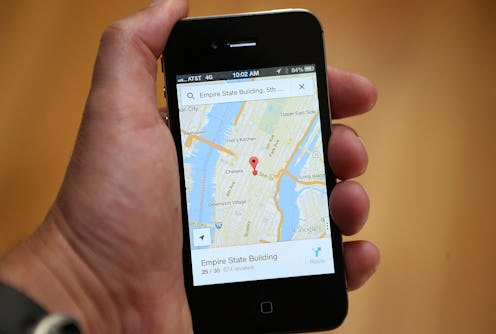Bet Google doesn't feel great about this one: The Obama administration's newest transportation bill would see the government regulating GPS-based apps like Google Maps. Apparently, the Feds just noticed that people aren't investing in expensive built-in GPS devices in their cars, and instead are using navigation apps on their phones. (News flash: our government is slow and old and doesn't really understand technology.) While we appreciate the Transportation Department's urge to make our roads safer, we can't help but wonder what exactly is so dangerous about mobile maps. Shouldn't they be focusing on drunk driving, or speeding, or something?
Well, it seems that the government has two primary concerns about the apps. One: They don't operate quickly enough and will force users to look at their phones for too long. Two: They make it hard to tell who's texting on the road. Which is true — one of the best and worst things about having your whole world on your phone is that it's easy to pretend you're doing something other than texting. What, me? Just checking out Google Maps!
In 2013, the Transportation Department tried to tackle delays in the apps by issuing "voluntary guidelines" which said that navigation apps should not take more than 2 seconds for a single interaction. We agree — and can they extend that rule to all apps on our phones?
While these all seem like good ideas in theory, we can't help but wonder how well the agency will be able to enforce them. After all, aren't these the guys who just realized people are using their phones for GPS?
Google Maps is only one of hundreds of apps like it, including Waze, an app that encourages its users to be interactive. Waze allows users to update one another on traffic conditions and roadblocks, and though the app requests that drivers not use the interactive portion while behind the front wheel, there is nothing to stop them from doing so. Similarly, since a large portion of Waze is based on such interactive updates, it would be hard to enforce regulations without changing important aspects of the app.
There's no reason to expect the government to be able to keep up with these apps, and if they require regulation, many think that's likely to prevent technological innovation. Even if they are successful, what's to stop someone who's caught texting from saying they were looking at Google Maps? Unless they plan on putting cameras in everyone's car, they're still going to issues like that one to grapple with.
Furthermore, what kind of precedent does it set to allow the government to have control over developing apps? Distracted driving is a big problem, but what's to stop government agencies from arguing that any aspect of an app is dangerous? I can think of reasons they might be able to come up with to ban Tinder.
And, sure right now they might be targeting the way we use Google Maps in cars, but it doesn't seem like a huge step to regulate how we use it while we walk. We know, we know — we walk like zombies (and into walls, sometimes) when there are phones in our hands.
